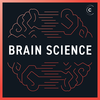Code review anxiety
Carol Lee (Clinical Scientist) shares her research on code review anxiety. We dive deep into her recent research paper “Understanding and Effectively Mitigating Code Review Anxiety”. We get into all the nooks and crannies of this topic — common code review myths, strategies for coping, the need for awareness and self-reflection, the value of exposure and practice to build confidence, the importance of team dynamics, respect, empathy, and connection, and more. This show is jam-packed with goodies for everyone…and we even give a nod to the work we did on our podcast Brain Science.

